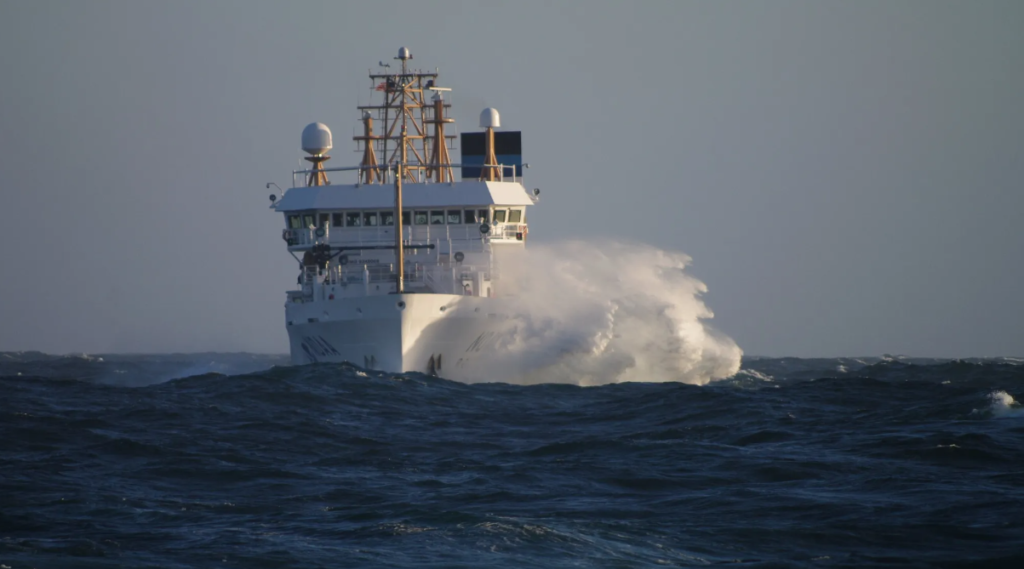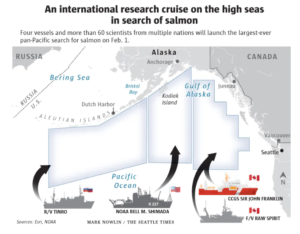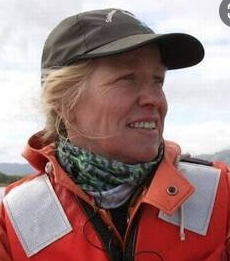
By LYNDA V. MAPES/The Seattle Times
An international team of more than 60 scientists in four vessels — including one based in Newport — is headed out on winter seas to investigate West Coast and Alaska salmon in the North Pacific.
The Bell M. Shimada, a Newport-based flagship research vessel of the National Oceanic and Atmospheric Administration, left Port Angeles, Wash. on Tuesday to join the expedition with ships from Canada and Russia.

The scientists will search for salmon as they probe mysteries that have long bedeviled scientists seeking to better understand the Pacific salmon that support cultures, communities and ecosystems across western North America.
This is probably the boldest, most expansive survey of salmon and the oceanography of the open ocean in the North Pacific, said Mark Saunders, Pacific region director for the International Year of the Salmon, lead organizer of the research cruise, estimated to cost about $10 million.
The 2022 expedition will involve a full ecosystem survey with open sea trawling and sampling of marine life in the upper ocean, as well as research on physical, biological and chemical oceanography. A gill net vessel deployed in the Gulf of Alaska alongside the research ships also will be trawling to test the catch efficiency of different gear types.
Novel technologies such as environmental DNA and genetic-stock identification will be used as scientists from Canada, Japan, the Republic of Korea, Russia and the United States collaborate in the cross-disciplinary effort.
The ocean has always been a black box of salmon science. Conditions make observations so difficult that the ocean, one of the most challenging stages of the salmon life cycle, is ripe for discoveries, said Laurie Weitkamp, U.S. co-chief scientist for the expedition, and research biologist at NOAA’s Northwest Fisheries Science Center Research Station in Newport.
The winter is a particularly crucial time in salmon development, when food is scare and competition and predation potentially deadly. Are fish getting enough to eat? Are they actually starving? Are there lots of competitors for prey? Who are they with?

“We are really trying to understand the entire ecosystem that supports salmon in winter, because our understanding is really poor right now,” Weitkamp said.
Scientists from some 14 areas of inquiry will probe everything from microplastics to the food web.
One crucial question scientists hope to shed light on is the distribution of different stocks, or types of salmon. Salmon follow hard-wired, ancestral feeding routes, just as caribou and other animals do on land, Weitkamp said.
Scientists wonder how salmon react to what they find along those routes. Do they peel off and go where the food is, or stick to their route, even if it means starvation?
The 2022 International Year of the Salmon expedition is supported by multiple partners, including governments, nonprofit organizations and industry. The cruise will be underway into April, covering four zones spanning a vast area of the North Pacific. The fleet includes a research vessel and fishing vessel from Canada, a research vessel from the U.S., and a research vessel from Russia.
While the vessels are at sea, the public can follow along at the expedition web page.
Lynda V. Mapes: 206-464-2515 or lmapes@seattletimes.com; on Twitter: @LyndaVMapes.


